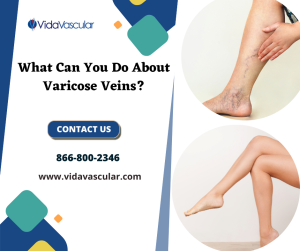What Can You Do About Varicose Veins?
What Can You Do About Varicose Veins?
Varicose veins – the most common vein disorder – are enlarged, twisted veins that do not move blood
effectively. When the one-way valves in your veins weaken, blood may flow backward and pool in your veins, causing them to become enlarged. Varicose veins usually show up in the legs and feet, because standing and walking increase the pressure on these veins. They look like bulging, bluish cords beneath the surface of your skin. Spider veins are similar to varicose veins, but they are smaller and closer to the surface of your skin. Varicose veins are common, affecting up to 60% of Americans. Women are more likely to have varicose veins than men. In many cases, varicose veins are just a cosmetic problem. But varicose veins can also cause pain and discomfort. In some cases serious complications, such as phlebitis (inflammation of the veins), skin ulcers, and blood clots, can occur.

Symptoms Accompanied by Varicose Veins:
• Prominent dark-blue blood vessels, especially in the legs and feet
• Aching, tender, heavy, or sore legs
• A burning feeling in your lower legs
• Swelling in the ankles or feet, especially after standing
• Breaks in the skin
• Itching around the vein
• Skin ulcers near your ankle – this is serious and requires immediate medical attention
.png)
.png)
Comments
Post a Comment